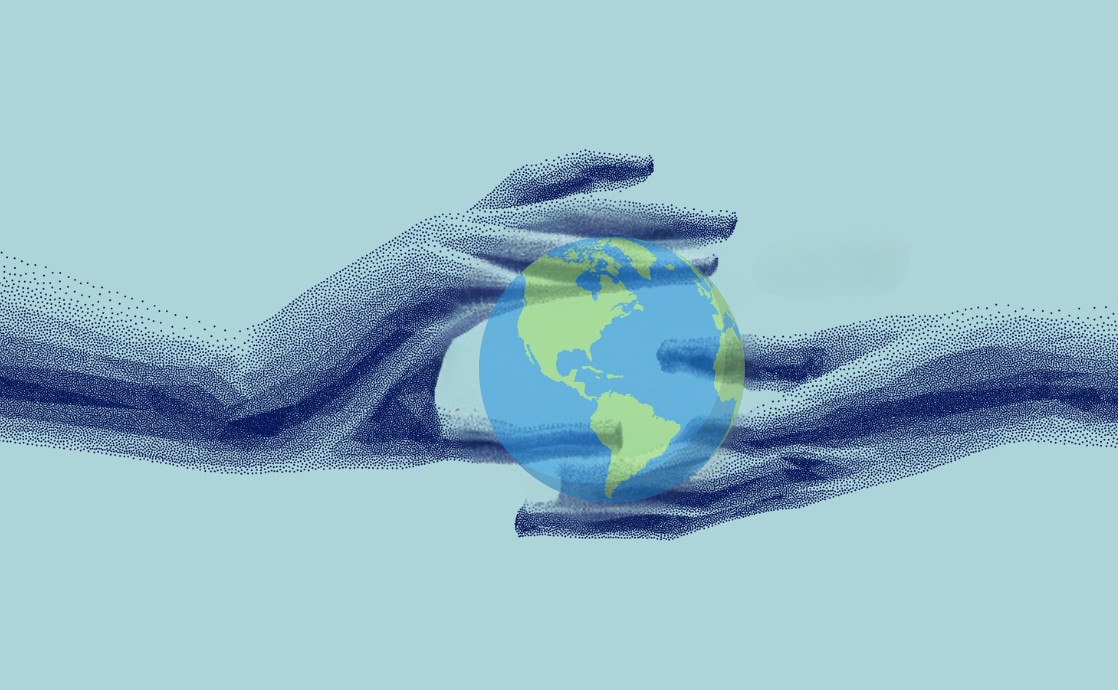The views expressed in our content reflect individual perspectives and do not represent the authoritative views of the Baha'i Faith.
The Baha’i writings frequently emphasize the creation of a universal civilization — one that integrates and balances the strengths of both Eastern and Western cultures.
This idea is central to the teachings of Abdu’l-Baha, who, in his speeches and talks given in North America during his travels in 1912, recorded in The Promulgation of Universal Peace, stresses the need for collaboration and integration between these two spheres. In an address he gave in New York City he said:
The East must acquire material civilization from the West, and the West must receive spiritual civilization from the East. This will establish a mutual bond. When these two come together, the world of humanity will present a glorious aspect, and extraordinary progress will be achieved.
Abdu’l-Baha critiqued material civilization when its primary focus limits itself to “… securing its sustenance and obtaining the means of its ease and comfort.“ While material progress is essential for human well-being, the Baha’i teachings clearly say that it is insufficient on its own. To achieve true civilization, humanity needs to incorporate a spiritual dimension, which elevates aspirations and infuses life with deeper purpose and meaning. This balance between the material and the spiritual is critical to creating a society that fosters not only technological advancements but also moral and ethical growth.
RELATED: Civilization: Can Human Society Evolve, or Are We Stuck Here?
The Social Realm
A balanced civilization requires a middle sphere — the social realm — that stands between the material progress of the West and the spiritual wisdom of the East. This social realm acts as a mediating force, integrating material advancements — the discoveries of the human mind in nature and the invention of tools and technologies — with spiritual insights, including the values and meanings that guide human behavior and relationships. The result: a balanced and progressive civilization, where neither materialism nor spirituality dominates at the expense of the other.
This middle sphere represents the social institutions and structures — the laws, governance, economic systems, education, and moral codes — that allow material and spiritual forces to interact and shape civilization. In this realm, values like justice and cooperation can grow within society’s institutions, ensuring the cultivation of both the material well-being and moral integrity of society.
The social realm is not just a passive space where these two forces meet; it actively shapes the nature of civilization by embedding spiritual values into material structures. It provides the essential mediation between material and spiritual progress, building the structures and institutions necessary for their integration. In that realm, the material achievements of the West and the spiritual wisdom of the East converge to create a civilization that is not only technologically advanced but also morally sound and socially just. By fostering this dynamic balance, the social realm becomes the foundation for a universal and harmonious civilization, one that uplifts both the material and spiritual aspects of human life.
A Deeper Understanding of Eastern Spirituality
The next important point of inquiry involves a deeper exploration of what Abdu’l-Baha meant by Eastern spirituality and how Baha’u’llah’s revelation influences the dynamic interaction between Eastern and Western civilizations. Understanding this relationship is essential for grasping the broader Baha’i vision of global civilization.
Abdu’l-Baha defined progress as the essence of spirituality, stating: “In the realm of spirit there is no retreat possible, all movement is bound to be towards a perfect state. Progress is the expression of spirit in the world of matter.” This statement reflects a profound principle: spirituality is not static but inherently dynamic, always evolving and pushing humanity towards higher states of existence. Thus, the spiritual civilization of the East should not be viewed as a fixed or monolithic tradition but as a living, transformative force that continually renews itself, most recently through the teachings of Baha’u’llah.
Eastern spirituality, in this context, must not be confused with the precepts of antiquity. While ancient spiritual traditions have significantly shaped Eastern thought, Abdu’l-Baha stresses that true spirituality is not a collection of static beliefs locked in the past. Instead, he presents Eastern spirituality, particularly as redefined by Baha’u’llah’s revelation, as a vital, ongoing tradition — one that adapts and evolves to meet the needs of contemporary society. This approach firmly rejects the idea that spirituality is merely a relic of history. Rather, spirituality is presented as an ever-evolving, progressive force for ongoing transformation, relevant to modern challenges and capable of guiding humanity toward a more balanced and progressive civilization. The Baha’i concept of religion itself — as a dynamic sequence of revelations building upon each other — means that fixed doctrines and dogma must continually give way to new understandings.
RELATED: Why We Need a Spiritual Civilization
Abdu’l-Baha’s emphasis on the progression of civilization makes an important distinction between the true meaning and application of spirituality and its traditional notions, which can sometimes become entrenched in outdated customs or even regress into fanatical behaviors. The Baha’i teachings promote an evolutionary approach to spirituality, one that constantly influences and guides society. In this way, spirituality remains a living, transformative force rather than a stagnant remnant of former times.
In the context of the interaction between East and West, Abdu’l-Baha presents unity not as a simple reconciliation of fixed, unchanging traditions but as the creation of a dynamic system that allows humanity to progress in both material and spiritual dimensions. The unity of East and West, therefore, is not about blending two static cultures, but about fostering an ongoing process of learning and exchange, where each civilization brings its unique strengths to the table. Together, they propel humanity forward by integrating material and spiritual progress in a way that mutually enriches the entire world.
Clearly, Abdu’l-Baha’s focus on Eastern spirituality reflects the view that a new revelation from the East — Baha’u’llah’s revelation — has emerged as the latest renewal of spiritual insight. This revelation establishes a point of reference capable of critiquing and revitalizing the entire tradition of Eastern spirituality. Rather than indulging in a nostalgic reminiscence of past glories, Abdu’l-Baha seeks to resurrect Eastern spirituality through a new, universal lens of understanding. This renewal is not confined to the East but speaks to the whole world, offering a transformative path that transcends geographic and cultural boundaries, guiding humanity toward a unified, progressive future.
This dynamic approach fosters a harmonious synthesis of material and spiritual progress, guiding humanity toward a universal civilization that embraces both dimensions. Through this evolving process, both the East and West contribute to a civilization that is balanced, progressive, and spiritually uplifted, ensuring the collective advancement of all humanity.
















Comments
Sign in or create an account
Continue with Googleor